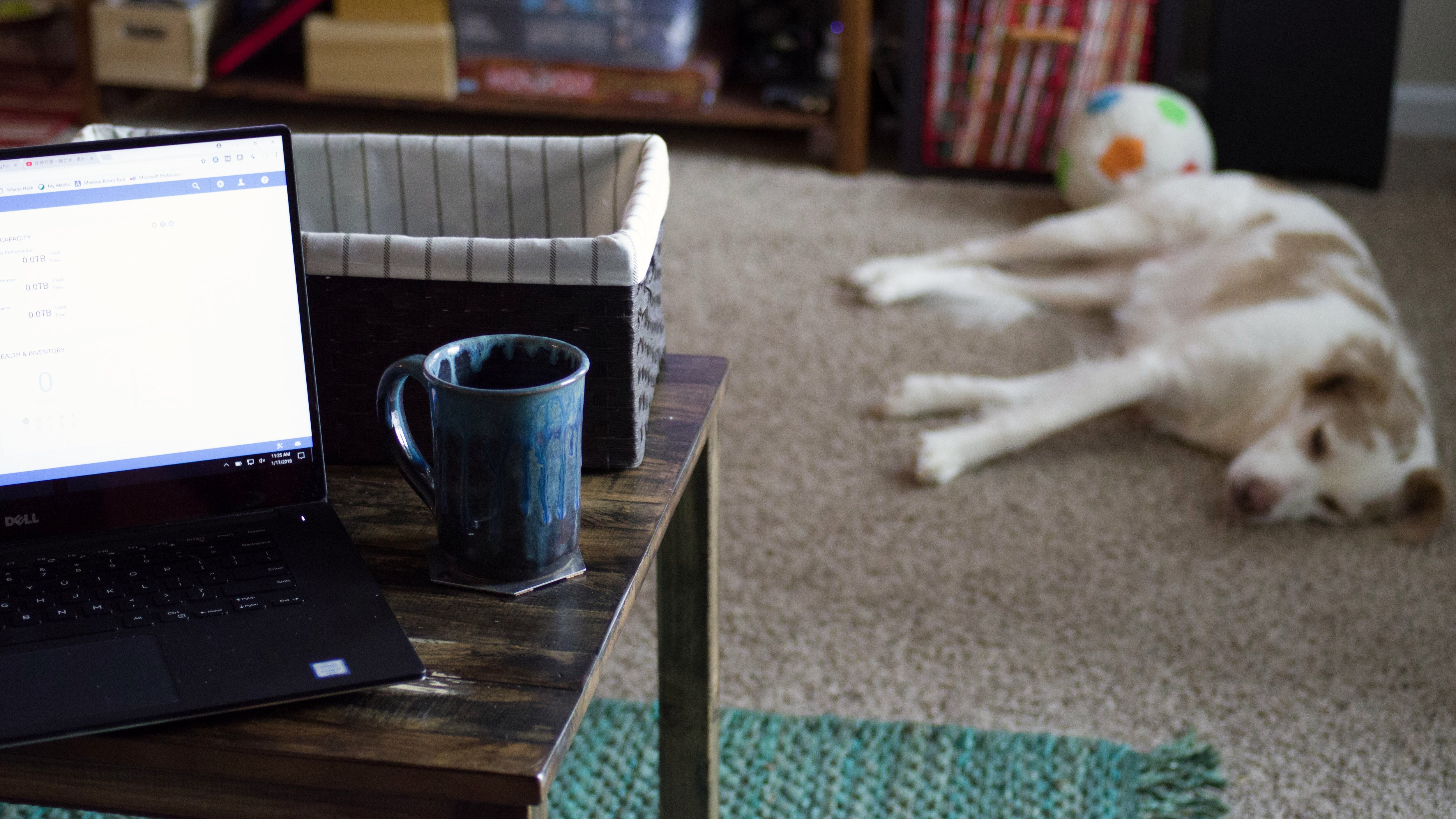Welcome to the golden age of the productive hermit.
Where once the American dream comprised a solid 9-to-5 job with a short commute and a guaranteed 30-minute lunch break, we now live in the era of telecommuting, in which non-manual laborers can basically work in a canoe provided they've got a solid Wi-Fi connection and a sense of entitlement.
But you didn't sign up for a full-time remote position to work in a canoe, or a coffee shop, or even a bar, did you? That might work for some, but for many, the appeal of working from home is the license to become a recluse who still pulls a paycheck.
Be forewarned: Being a work hermit has its drawbacks.
I should know. When I cast off the shackles of my longtime desk job for a full-time remote writing gig, I thought I would spend the week doing nothing but day-drinking in my underwear. But balancing work and domesticity at various life stages, I realized one must adopt certain parameters to avoid slowly morphing into an amorphous, socially awkward shell of yourself.
Here's how to survive—nay, thrive—as a remote worker.
Put on your pants.
This seems counterintuitive. I distinctly remember the joy of my first pantsless day at work. It was pure catharsis after years of slacks-shackled imprisonment. But then things fell like dominos. First, it was no pants. Next, I began neglecting to brush my teeth until 4 pm. I became a socially awkward, bearded specter with breath like a hospital laundry basket. And that was just the first week.
You can get lazy, and you can get gross. Establishing a normal routine before work—even if it means just getting dressed, brushing your teeth and having breakfast—helps you shake the cobwebs out of your brain and separate work from home, even if they're the same place. So put on pants. Yes, sweatpants count.

Move around at least a little.
Early on, I bought a Fitbit. It crushed me, and not just because it looked stupid: The first day I used it, I logged just under 1,000 steps. It sent me into an existential crisis, simultaneously embarrassed for moving so little and impressed that I moved so much without leaving my tiny duplex.
But it was also an eye-opener. You have to move. If you don't, you're going to have back pain and find sweat on areas of your body where no sweat glands exist. You will become sluggish and probably sick. There's a reason Ted Kaczynski was both relatively fit and a prolific writer: Dude clearly had a fitness routine he could pull off without leaving his home office. So get up and move around. Maybe do some jumping jacks or pushups.
Do not answer phone calls from friends during the work day.
Nine times out of 10, if friends call you during work, they're going to ask you for a free ride to the airport or to let their dog out. Such friends cannot comprehend the concept of somebody not going to a physical place of business to work, so they automatically assume you're at home smoking pot and playing video games all day. Maybe you are, but that's between you and HR. So just don't answer.

Create your fortress.
If you've got the space to set up a separate spot where your stuff isn't spilling into common areas, it's time to make that place your ideal workspace. Get a desk that suits your needs—I used to have an obnoxiously large 1950s teacher's desk with giant drawers that served as a bar. Others have standing desks. Decorate your area and stock it with snacks. Hell, maybe install a water cooler where you can talk to your imaginary co-workers about last night's episode of whatever the hell people talk to their co-workers about. If you're fortunate enough that this office is its own room, shut it down during non-working hours. Nobody likes to hang out at work after hours. So don't.
Do some meal planning.
Basically, you should leave to take lunch breaks. But if you're owning the work-hermit lifestyle, you're not gonna do that. And you're not gonna blow all your money on delivery, which also requires you to interact with people. So make like the office schlubs and plan your meals. Make one big meal early in the week and feast on the leftovers for lunch. Or learn to prepare quick, easy meals. Or maybe figure out how that Instant Pot thing works—you have time to experiment. Might as well eat better than inhaling a daily bag of Chili Cheese Fritos over the sink.

Adopt an end-of-day routine.
This one came courtesy of a therapist friend, who I guess isn't technically my friend because I was paying him to listen to me. Maybe it's as simple as ceremoniously shutting down your computer, putting on a jacket, and walking around the block. Or maybe you're into meditation—do that for a while at home. But unless you develop that into a routine, you're going to fall into the trap of never stopping work. That's telecommuting's Achilles' heel. You'll keep checking email or trying to get ahead of tasks like a pantsless snake swallowing its tail. Trust me on this. I took this advice far too late, and have been working nonstop writing articles like this for the past three days. To me, The Shining now seems like a documentary. Don't let this happen to you.

Five Portland-Made Blankets, Reviewed
How to Work From Home Without Losing Your Mind
The Great Oregon Movie Binge Watch
Four Portland Delivery Services You Might Not Know About
Millennials on Social Media Are Driving a Nationwide Houseplant Boom
